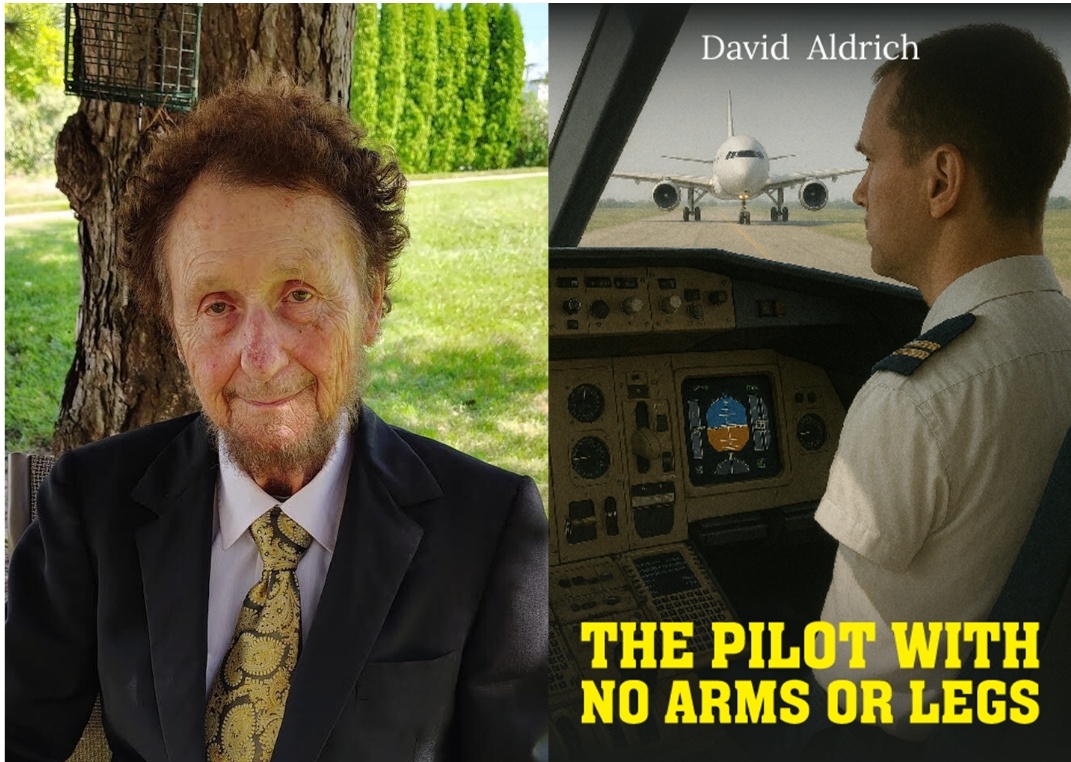Blog
When Identity Rises Beyond The Body And Finds Strength In The Human Spirit

David Aldrich’s novel, The Pilot With No Arms Or Legs Goes To War, feels less like fiction and more like a confession of the human heart. It’s raw, honest, and deeply personal. The book doesn’t glorify suffering; it shows how identity can survive after everything that once defined it disappears. What makes it powerful is its quiet truth: that life doesn’t stop when the body changes, it just finds a new way to move forward.
How Struggle Becomes The Mirror Of Self-Discovery
The story doesn’t rush to inspire. It takes its time, letting pain breathe before strength arrives. Through stillness, through days that feel heavy and long, the main character slowly meets the version of himself he never knew existed. That meeting isn’t gentle. It’s uncomfortable and real. But that’s what makes it matter. Readers feel that honesty, that moment when a person looks in the mirror and says, “This is me now.” It’s a different kind of courage, not loud, not heroic, just quietly human.
Why Acceptance Opens The Door To Freedom
In this story, acceptance doesn’t look graceful. It comes through frustration, through days of silence and doubt. The character learns that peace doesn’t arrive when life improves; it begins when he stops fighting what can’t be undone. That understanding changes everything. Acceptance doesn’t mean he’s fine with it, it means he’s done pretending he’s not broken. And in that moment, something powerful shifts. The reader feels that calm that only comes after exhaustion, the one that says, “I can still live, even like this.”
How The Mind Builds A World The Body Cannot
Aldrich writes about imagination as if it’s oxygen. When the body becomes still, the mind learns to travel. The main character lives entire worlds inside his thoughts, worlds that don’t rely on arms or legs, only memory and will. Those scenes stay with the reader because they feel true. Everyone has moments when imagination keeps them alive. It’s not escape; it’s endurance. The book reminds us that the mind can lift us to places our bodies may never reach.
The Role Of Purpose In Rebuilding Identity
Purpose is what pulls the character back to life. It’s not dramatic, there’s no single turning point. It’s built slowly, like sunlight creeping through blinds after a long night. He learns that meaning doesn’t have to be grand. It can be as small as doing what he can, for as long as he can. Aldrich makes that feel real. The book isn’t about heroism; it’s about finding reasons to keep trying. Readers connect because everyone has known that kind of fight, the quiet one between despair and determination.
When Compassion From Others Restores The Sense Of Self
No one heals in isolation, and the novel understands that. The character’s strength deepens through the people around him, the ones who show up without needing to fix anything. They sit, they listen, they care. Their presence slowly becomes the ground he stands on. Aldrich doesn’t romanticize this. He keeps it simple, almost ordinary, which makes it more believable. Readers recognize that kind of love, the kind that doesn’t save you but stays with you until you learn to save yourself.
Why Stories About Inner Strength Change How We See Ourselves
By the later chapters, it’s clear that the book isn’t just about one man. It’s about everyone who’s ever had to rebuild after loss. Strength, here, isn’t about fighting harder; it’s about staying kind, staying hopeful, and choosing to keep living. The story reshapes how readers see resilience. It makes them pause and think about their own quiet battles, the ones no one sees. And that’s why it lingers. It doesn’t shout its message; it whispers it in a way that feels real.
Ending: Rediscovering The Meaning Of Being Whole
When the book ends, there’s no big conclusion. Just peace, a calm that comes from understanding that being whole doesn’t mean being complete. The Pilot With No Arms Or Legs Goes To War leaves you sitting in silence, thinking about what it means to live fully in an imperfect body, in an imperfect life. Aldrich’s writing closes like a deep breath, gentle but sure. It reminds readers that identity doesn’t fade when life changes shape. It bends, it rebuilds, and it survives. And maybe that’s what being human is really about.
Blog
When Guilt Becomes The Shadow You Carry Until You Learn To Forgive Yourself

Guilt is quiet. It doesn’t shout; it lingers. In Under the Current, Jared Siler doesn’t write about the kind of guilt that fades after an apology. He writes about the one that stays, the guilt that hides under smiles, routines, and unspoken words. His story moves through that shadowed space where people convince themselves they’ve moved on while their hearts still replay the same moment. It’s haunting because it’s real. Every page feels like a mirror to the parts of yourself you’d rather not meet.
The Past Has A Way Of Whispering When The World Is Silent
Siler’s writing captures how memory never fully disappears. The past waits patiently for the quiet, and then it returns, softly, relentlessly. The character in Under the Current finds that even small triggers bring old feelings rushing back. There’s no escape in distraction, only delay. Through his words, Siler reminds readers that healing doesn’t come from pretending. It comes from facing what the silence brings.
Shame Grows In The Spaces Where Truth Is Avoided
One of Siler’s strongest insights is how easily guilt turns into shame when left unspoken. What begins as regret slowly becomes identity. The character stops seeing himself as someone who made mistakes and starts believing he is the mistake. That quiet shift becomes the emotional center of the story. Siler never lectures. He shows the slow corrosion of hiding, the way shame can convince even strong people to live half-alive.
Forgiveness Does Not Mean Forgetting What Happened
When the character begins to face his guilt, it doesn’t arrive with relief; it arrives with trembling honesty. Siler doesn’t make forgiveness look easy or instant. Instead, he describes it as a decision made again and again, one breath at a time. To forgive yourself, he suggests, isn’t to erase the past but to stop letting it decide who you are. That understanding becomes the quiet heartbeat of the book.
The Current Pulls You Toward The Truth You Keep Avoiding
There’s a reason Siler chose Under the Current as his title. The “current” isn’t just water, it’s conscience, memory, emotion. It’s what moves beneath every calm surface. The character tries to swim against it, to outpace the reminders of guilt, but eventually he understands that the only way forward is through. That moment, when resistance turns into surrender, is written with rare honesty. It’s where the story stops being just fiction and starts feeling like a confession we’ve all made silently.
Freedom Begins When You Admit You’re Still Learning To Heal
part of the story. The character’s transformation isn’t dramatic. It’s slow, raw, and deeply human. He learns that healing isn’t a clean process; it’s a return to truth. The current doesn’t erase his past; it teaches him how to live with it. That realization gives the book its depth and its calm power.
Honesty Becomes The Bridge Between Regret And Redemption
One of the most beautiful threads in Siler’s writing is how he uses honesty as redemption. There’s a turning point when the character finally stops performing strength and begins speaking truth, to himself and to others. It’s not easy. The words stumble, the walls resist, but once honesty begins, peace follows. Siler doesn’t write this as a grand revelation but as a quiet rediscovery. Sometimes the smallest truths are the ones that save you.
The End Feels Like A Beginning You Didn’t Expect To Find
By the final pages, guilt hasn’t vanished, but it’s no longer the main character. Acceptance takes its place. Siler closes the story not with resolution but with release. The reader feels a calm ache, the kind that comes when you realize forgiveness is not about perfection, it’s about permission. The permission to start again, to love again, to be flawed and still worthy of peace. Under the Current leaves you with that quiet courage, the belief that even after mistakes, you can still find your way back to yourself.
Blog
Master the Art of Predicting Tennis Scores with These Proven Tips and Techniques

As an avid tennis fan, you must be eager to predict what the game will be like in future. Perhaps you are doing this for fun, or perhaps you want to increase your knowledge, and at the same time, supplement your income. Whichever the case, you might become an expert at forecasting tennis scores with a few expert tactics, regardless of your level of experience.
With that in mind, let us check out some of the tips and techniques to help you in predicting tennis scores without a hassle.
Examine the Player’s Performance and Form at the Moment
The first place to look for accurate tennis score predictions is the players’ recent performance. Recent performance is often a reliable indicator of how a player will perform in their upcoming game. For instance, have they recently been winning or losing?
How have they fared in comparison to opponents with higher rankings? You can obtain important information by looking into their win-loss record and track record of consistency.
Consider Surface and Conditions
Conditions and surfaces are crucial factors to look at while predicting tennis scores. Tennis is played on hard courts, grass, and clay surfaces. The way the game is played varies depending on the type of surface, and participants frequently have preferred options.
For example, some players excel on clay but struggle on grass, or the other way around. When attempting to forecast tennis scores, consider the players’ respective performance on each surface. For instance, Roger Federer performs well on grass, and Rafael Nadal excels on clay courts.
Remember the match circumstances as well. Is it outside or inside that the game is being played? Is it hot, muggy, or windy? These elements may have an impact on a player’s performance and overall score.
Employ Statistical Instruments
Sports analytics provides a plethora of websites and tools that provide real-time updates, winning percentages, and comprehensive player statistics. These sites can be used to forecast outcomes based on information.
The Sports Prophets can help you improve your prediction because they track specific statistics like break points saved, first-serve percentages, and victory rates on various surfaces.
Head-to-Head Matchups Matter
Analyzing players’ prior results against one another is a helpful method of forecasting tennis scores. Even against players that are ranked higher, some players find it difficult to defeat them. Examine their previous games to look for any trends.
Does one player typically have an easy win, or do their matches tend to be quite close? You can determine if the match will be competitive or one-sided based on this historical data.
Think about Player Fatigue and Injuries
Fatigue and injury can have an impact even on the best players. Find out if a player is recovering from an injury or has played a lot of matches lately before predicting tennis scores. A fatigued player may not give their utmost effort, which could produce unexpected outcomes.
Analyze Playing Techniques
Tennis is a mental game as much as it is a physical one. The way that players perform has a major impact on how a match turns out. While some players use technique and smart movement to control the game, others are aggressive and hit hard from the baseline.
Comprehending the interplay between several styles can aid in forecasting the outcomes of games. You might anticipate lengthier rallies and more opportunities for tiebreaks, for instance, if a player with a reputation for making big shots is facing a defensive player who excels at returning balls.
Conclusion
Predicting tennis scores requires you to be well-informed, and to have the right intuition and analysis. The above tips and advice from experts are just what you need to navigate this field without a hassle. We hope that our guide has cleared up all of your doubts and errors when it comes to predicting tennis scores.
Blog
Compelling Reasons for the Switch to Eco-Friendly Tote Bags

Tote bags are a sort of bag that can be used by either gender. Their adaptability makes them one of the most effective marketing tools for companies. They are made from a variety of materials, each with unique properties and appealing attributes. But in this day and age, there is a need to move away from certain materials and toward eco-friendly alternatives. The relevant arguments for selecting eco-friendly tote bags over other options will be discussed in this article.
1. Decreased Plastic Waste with Eco-Friendly Tote Bags
Plastic is one of the materials used to make some bags. Plastic garbage pollutes the environment, endangers wildlife, releases chemicals into the air, has a detrimental effect on human health, and upsets ecosystems. Introducing eco friendly tote bags is one way to address the problems related to plastic waste from other bags. Eco-friendly tote bags are meant to take the place of single-use plastic bags. By doing this, trash is decreased, and the impacts of plastic waste are reduced.
2. A Reduction in Carbon Footprint
The notable reduction in carbon footprint associated with the use of eco-friendly materials in tote bag production is one of the main drivers of this shift. Reduced carbon emissions result from the energy efficiency and sustainability of the environmentally friendly materials’ production process. Accordingly, the impact of production is minimized, and greenhouse gas emissions are decreased. This creates a cost-effective choice without compromising the environment’s health.
3. Preservation of Natural Resources
Plastic products are discarded regularly, resulting in the consumption of additional resources. But the introduction of eco-friendly materials closes this gap. These recyclable and biodegradable materials help to preserve natural resources.
Furthermore, compared to non-renewable resources like fossil fuels, renewable resources, which are utilized to create some eco-friendly tote bags, may be used sustainably. Additionally, this helps to preserve the environment’s resources. Through the development of the circular economy and the encouragement of sustainable industries, it also promotes sustainable behavior.
4. The Durability and Reusability of Eco-Friendly Tote Bags
The important environmental and financial benefits of switching to eco-friendly tote bags are largely attributed to their durability and reusability. Long-term reusability of the materials is facilitated by factors such as their high quality, reinforced stitching, ergonomic design, quality control, and design elements. Furthermore, they are more resilient due to their resistance to water and tearing. Their convenience of use is enhanced by these two qualities. This also makes them simple to maintain and clean.
5. Consumer Awareness and Responsibility
Switching to eco-friendly tote bags is also important because it shows a dedication to environmental stewardship and increases consumer understanding of sustainable practices. By using them for marketing purposes, businesses are consciously choosing to reduce the amount of plastic garbage they produce and the related environmental issues like pollution and habitat damage. This is a strategic tactic used by brands to attract environmentally conscientious customers.
Conclusion
The public appeal of eco-friendly materials is one of the reasons to choose them for tote bag production. Businesses are taking advantage of this to their marketing benefit due to the positive impact on the environment and efficient cost management.





